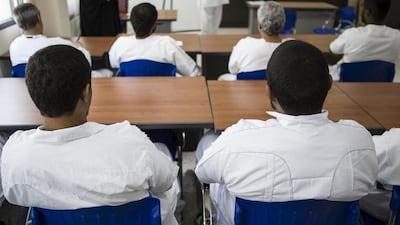DUBAI // The hallways are clean, and through the windows can be seen garden beds bragging of their brightly coloured blooms.
Men rush to classrooms, some with big-screen TVs and computers, while others are hard at work in a crafts centre.
Welcome … to Dubai Central Prison.
“No one has to do anything unless they want to, but who wants to sit in their room all day alone?” asked Lt Ali Dhabyan, director of educational programmes at the jail. “With these services the inmates are kept busy and out of trouble and our job as authorities is made easier.
“Thank God, we don’t encounter problems in the jail. I would say our one problem is to convince some of the inmates that the services we provide are for their own benefit, whether they will be deported afterwards or not.”
The Dubai prison recently open-ed its doors for a tour by The National, for which Lt Dhabyan played guide.
“We offer a number of programmes and cater to all nationalities,” he said. “It is our duty to also follow up on those who have been released and make sure they are doing all right.
“We try as much as we can, with outside partners, of course, to help them become contributing members of society by cooperating with them and helping them find jobs.”
Maj Abdullah Al Khidr, of the education and training department, explained that the prison’s programmes were split into four divisions.
“We have the religious division, sports division, educational division and vocational division,” Maj Al Khidr says.
“We have a crafts department where inmates make everything from chests to furniture, and we have a system that allows inmates to attain a high-school education.”
About 150 men work at the crafts centre five days a week, from 8am until noon, and their work does not go unrewarded.
“Inmates who work at the crafts centre get a monthly salary with a 5 per cent bonus from yearly sales,” says Maj Al Khidr.
He said wages depended on job title: “It’s like a normal factory, and the inmates have different job titles and positions, however, workers receive a minimum of Dh200 a month.”
Maj Al Khidr explained that it was against the jail’s policy for inmates to carry cash, so an e-cash system is in place.
“We want to avoid problems between prisoners and avoid possible theft, so each inmate carries an ID card with their name, picture and thumbprint,” he said.
“Their money – even amounts deposited by family members – are on this card, which can be used to purchase things from the internal supermarket. It is sort of an internal debit card.”
Lt Dhabyan said none of the courses or work programmes for the inmates were compulsory.
Sports competitions also take place throughout the year, encouraging the inmates to become more active.
“This year we have scheduled eight competitions, which include activities such as soccer, basketball, tennis, cricket and even chess,” Lt Dhabyan said, adding that 1,435 inmates took part in six competitions last year.
“Women can also take part in separate sports activities during morning sessions and have participated in basketball games, soccer games, as well as tug of war.”
He said 171 male and female convicts were involved in the jail’s education programmes last year. “We offer a number of classes, including Arabic lessons and road-safety sessions.”
One programme – Quran recital – allows inmates to reduce their sentences.
“As you know, religion is something that is very calming and spiritual,” Lt Dhabyan said. “Depending on how many parts of the Quran inmates memorise, they can have their sentence decreased.
“If an inmate memorises three parts of the Quran, he or she will have their sentence decreased by six months.
“Five parts of the holy book will decrease a sentence by one year; 10 parts will decrease the sentence by five years; 15 parts will decrease a sentence by 10 years; 20 parts will decrease a sentence by 15 years; and 30 parts — the whole Quran — will decrease a sentence by 20 years.”
Of course, that was dealt with on a case-by-case basis and depended on the crime they had committed, Lt Dhabyan said.
“We want to help them and encourage them to decrease their sentences, however, we make sure that by doing so it is not violating anybody’s else’s rights,” he said.
There have been 11,553 inmates – 1,635 women and 9,918 men – taking part in the Quran recital programme since its launch in 2002.
“Since the launch, 1,849 inmates had their sentences decreased and/or released,” said Lt Dhabyan. “There was a Cameroonian woman who was jailed on drugs charges. She converted to Islam, learnt Arabic, memorised the whole Quran and was released after being rewarded Dh10,000.
dmoukhallati@thenational.ae

